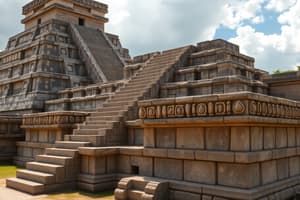Podcast
Questions and Answers
Which statement best describes the core concept of Science, Technology, and Society (STS)?
Which statement best describes the core concept of Science, Technology, and Society (STS)?
- STS examines the interconnectedness and mutual influence between scientific knowledge, technological innovations, and societal values, needs, and structures. (correct)
- STS focuses on the economic impact of technological advancements on global markets.
- STS primarily aims to promote scientific literacy among the general population.
- STS is solely concerned with the ethical implications of new technologies.
What is the primary benefit of renewable energy sources like solar, wind, and hydroelectric power?
What is the primary benefit of renewable energy sources like solar, wind, and hydroelectric power?
- Improved energy efficiency in existing infrastructure.
- Reduced dependence on fossil fuels, leading to lower carbon emissions. (correct)
- Increased geopolitical stability due to decentralized energy production.
- Enhanced energy storage capabilities for large-scale industrial applications.
Which of the following is a significant contribution of Meso-American civilizations to science and engineering?
Which of the following is a significant contribution of Meso-American civilizations to science and engineering?
- The creation of the steam engine.
- The discovery of penicillin.
- The development of the concept of zero. (correct)
- The invention of the printing press.
What aspect of ancient Egyptian surgery showcases their contributions to medicine?
What aspect of ancient Egyptian surgery showcases their contributions to medicine?
How does technology impact agriculture in terms of sustainability?
How does technology impact agriculture in terms of sustainability?
How does climate science contribute to the well-being of humanity?
How does climate science contribute to the well-being of humanity?
What is the purpose of Project NOAH (Nationwide Operational Assessment of Hazards)?
What is the purpose of Project NOAH (Nationwide Operational Assessment of Hazards)?
What is the role of ethics in technological advancement?
What is the role of ethics in technological advancement?
What is a key benefit and a potential risk associated with nuclear energy?
What is a key benefit and a potential risk associated with nuclear energy?
What is the primary goal of the Philippine Space Program?
What is the primary goal of the Philippine Space Program?
Flashcards
What is STS?
What is STS?
Interdisciplinary study of how science and tech affect society.
Renewable Energy
Renewable Energy
Solar, wind, and hydroelectric power.
Meso-American contributions
Meso-American contributions
Maya, Aztecs, and Incas made significant advancements
African contributions
African contributions
Signup and view all the flashcards
Eudaimonia
Eudaimonia
Signup and view all the flashcards
Transhumanism
Transhumanism
Signup and view all the flashcards
Tech impact on agriculture
Tech impact on agriculture
Signup and view all the flashcards
Project NOAH
Project NOAH
Signup and view all the flashcards
Human flourishing
Human flourishing
Signup and view all the flashcards
Utilitarianism
Utilitarianism
Signup and view all the flashcards
Study Notes
- Science, Technology, and Society (STS) is an interdisciplinary field.
- STS studies how scientific knowledge and technological innovations affect society.
- Societal values, needs, and structures influence the development and use of science and technology.
- Science, technology, and society are interconnected and mutually shape each other.
- Renewable energy sources include solar, wind, and hydroelectric power.
- Renewable energy reduces dependence on fossil fuels.
Meso-American Contributions
- Meso-American civilizations, including the Maya, Aztecs, and Incas, significantly contributed to science and engineering.
- The Mayan calendar was based on precise astronomical calculations.
- The Maya independently developed the concept of zero in mathematics.
- The Inca engineered the Machu Picchu water system, which remains functional.
African Contributions
- African civilizations contributed to medicine, engineering, and education.
- Ancient Egyptian surgery involved early cataract removal and prosthetics.
- Timbuktu University was one of the oldest learning centers.
- Advanced metalwork techniques in West Africa involved iron smelting technology.
- Eudaimonia is the highest human good, achieved through virtue, knowledge, and purpose.
- Transhumanism enhances human abilities through technology, such as brain implants or genetic modifications.
- Technology's impact on agriculture increases efficiency, productivity, and sustainability.
- Advancements include precision farming, biotechnology, automation, and data analytics.
- Food security and economic opportunities are ultimately improved.
- Automation in manufacturing leads to job displacement.
- Climate science helps humanity by predicting weather patterns.
- Science and technology contribute to sustainability by developing green technology like solar panels.
- Project NOAH (Nationwide Operational Assessment of Hazards) is a disaster risk reduction initiative.
- Project NOAH provides real-time weather data and flood forecasting for preventive measures.
- Human flourishing is realizing a person's full potential in terms of well-being, happiness, and fulfillment.
- Ethics in technological advancement ensures innovations are used responsibly and benefit humanity without harm.
- Dr. Fe del Mundo was a pioneering pediatrician.
- Dr. Fe del Mundo was the first woman admitted to Harvard Medical School and invented the incubator.
- Nuclear energy provides clean power.
- Batteries are a preventive measure to radiation and waste disposal.
- Sigmund Freud explored the unconscious mind in human psychology.
- Freud introduced psychoanalysis, influenced by the unconscious mind.
- Challenges in space exploration include high costs, medical concerns, and debates about prioritizing Earth's problems first.
- Indigenous technologies in the Philippines include the Banaue Rice Terraces, herbal medicines, and traditional fishing techniques.
- Space exploration expands human knowledge, discovers new resources, and potentially finds habitable planets.
- Utilitarianism says the good life is about maximizing happiness for the greatest number of people.
- The belief is that the best action maximizes happiness for the greatest number of people.
- The ethical dilemma of AI in medicine questions whether AI should be trusted to make life and death medical decisions.
- Ethical considerations in genetic engineering encompass issues like altering human DNA, cloning, and genetic privacy concerns.
- Society influences scientific research and technology development by aligning research with societal needs through technology.
- Automation increases work efficiency and impacts job displacement.
- The Philippine Space Program develops space technology, including launching Diwata and Maya satellites.
- Science in food production increases agricultural efficiency and food security.
- Renewable energy gains popularity because it reduces carbon emissions and reliance on fossil fuels.
- Philippine Science High School was established to enhance, develop, and train future scientists and engineers.
- Ethics in technological advancement ensures innovation is used responsibly and benefits society.
- The significance of the human genome ("human genes," "human DNA") allows advancements in genetic medicine and research.
- Government should invest in science and technology to drive national progress and economic growth.
- The Green Revolution promoted agricultural innovations to increase food production and ensure national food security.
- The Green Revolution introduced hybrid rice, pesticides, and fertilizers to increase yields and reduce poverty among rural populations.
- Pre-colonial Filipinos practiced herbal medicine, traditional hilot, hagdan hagandang palayan, bahay kubo, and astronomy based on weather observation.
- Asian civilizations contributed paper, the compass, and gunpowder to science.
- E-commerce changes business by decreasing the need for physical online presence.
- Algebra, developed by Al-Khwarizmi, forms the basis of modern mathematics.
Studying That Suits You
Use AI to generate personalized quizzes and flashcards to suit your learning preferences.




